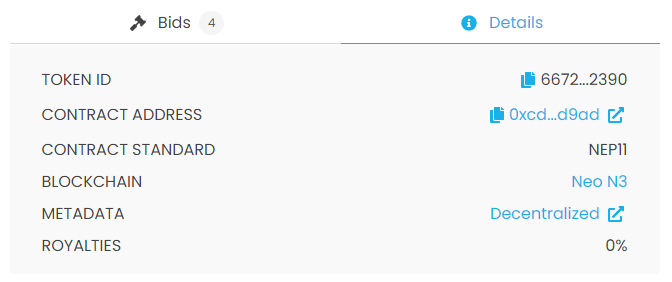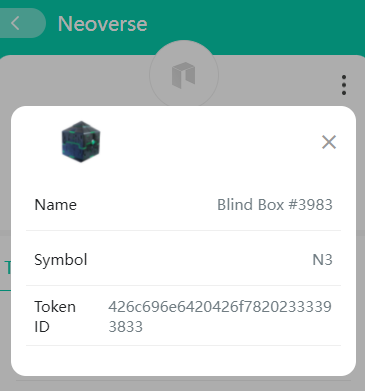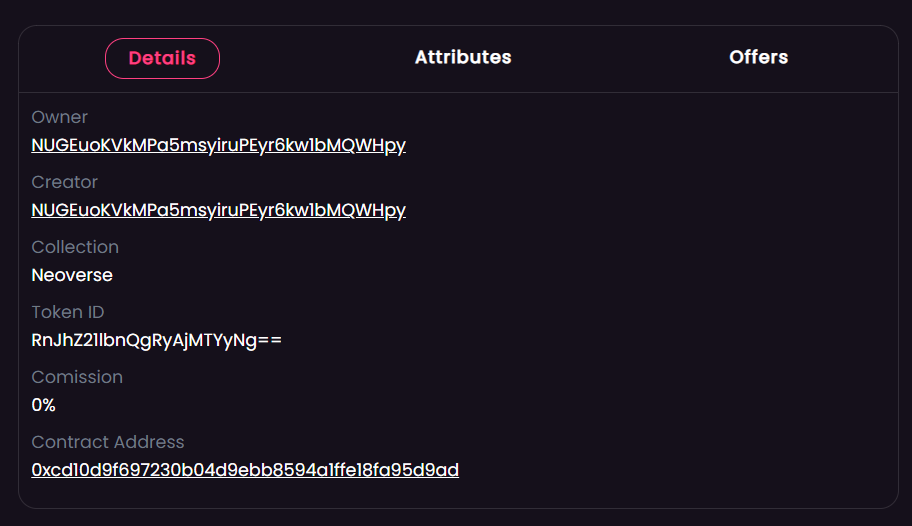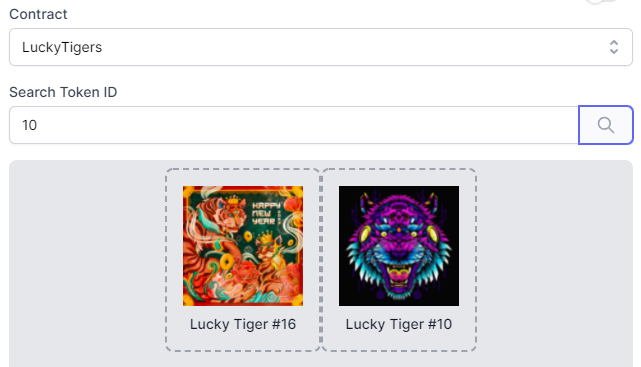Types of NFT IDs
Every NFT minted in a Neo N3 smart contract has its own unique ID and the same NFT ID can be represented in multiple ways.
Currently, we have identified 3 different types or formats used by various apps to represent NFT IDs in the Neo N3 ecosystem.
- Integer IDs
- Hexadecimal IDs
- Base64 encoded IDs
For example, a Neoverse’s E #167 Core NFT has the following IDs which are equivalent:
- 122641909985643573647974469
- 45202331363720436f7265
- RSAjMTY3IENvcmU=
Integer IDs
Integer IDs are numeric IDs and is the easiest to identify and understand as they contain numbers only (0-9).
GhostMarket uses integer IDs for Neo N3 NFTs which can be seen when you view a NFT’s details as shown below.
GhostMarket
You can also find the full token ID from the URL in your browser’s address bar when viewing an NFT in GhostMarket.
https://ghostmarket.io/asset/n3/0xcd10d9f697230b04d9ebb8594a1ffe18fa95d9ad/66722174622570874893265282008455672390/
Hexadecimal IDs
Hexadecimal (or hex) IDs are composed of numbers (0-9) and 6 specific alphabet letters (A-F or a-f).
You may refer to Wikipedia If you would like to read a detailed description of what a hexadecimal is.
There are situations where hexadecimal IDs may consist of only numbers, which may make them seem like integer IDs. However, a hexadecimal ID and an integer ID with the same value will point to different tokens.
For example:
- a hexadecimal ID of
11is equivalent to an integer ID of17 - an integer ID of
11is equivalent to a hexadecimal ID of0b
Neo has a converter for users to conveniently convert between types.
The Neoline wallet and Neotube explorer uses hexadecimal IDs.
Neoline
Neotube
Base64 Encoded IDs
Base64 encoded IDs are composed of A-Z, a-z, and 0-9 (some may include: + and /) and may or may not end with =.
Again, if you would like a detailed and more accurate description, you may refer to Wikipedia.
OneGate explorer and SkyHut uses base64 encoded IDs.
OneGate
SkyHut
Summary
In common everyday scenarios, you would not need to worry about an NFT’s ID as most NFT collections strive to have unique names for their NFTs, which is a much more friendly way for users to differentiate between NFTs.
However, in cases where you need to share a specific NFT ID with another party, it is good to have a basic understanding of the different types of IDs and ensure the same type of ID is used by all parties.
N3 Trader
We have updated N3 Trader to support all 3 types of token IDs.
When creating an open trade, you can input any type of token ID and search for matching NFTs.
All matching NFTs will be returned and displayed with its name and image. You can then select the NFT you wish to trade.
In N3 Trader, mousing over NFTs in trade will display its ID in hexadecimal.







